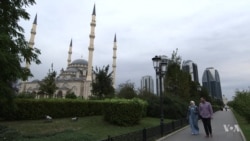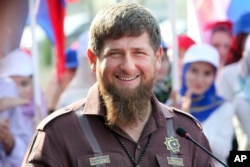Grozny's Akhmad Kadyrov Mosque, named in honor of the slain father of strongman Ramzan Kadyrov, fills up quickly for Friday prayers.
Built in 2008, the mosque is one of the largest in Europe, holding more than 10,000 worshippers on three floors.
A steady stream of boys and bearded men in Islamic dress shuffle past armed security, who patrol the park-like grounds, and are funneled into the mosque by guards who man metal detectors at the doors.
Ramzan Kadyrov seems firmly in control
Since his appointment by Russian President Vladimir Putin, the younger Kadyrov has fought a largely successful battle against Islamist insurgents who killed his father in 2004.
While occasional attacks still occur in Chechnya, including a 2014 suicide bombing in Grozny that killed five policemen, the number of casualties among security forces has dropped dramatically.
Critics say Chechnya still has a dictatorship
But rights activists argue Kadyrov's iron-fisted methods, such as collective punishment for militants' relatives, make the cure as bad as the disease.
“Instead of the dictatorship of the Islamic fundamentalists we get a different dictatorship that is also spreading beyond Chechnya and is a threat to Russia similar to the one that Ramzan Kadyrov is fighting against,” says Oleg Orlov with Russia’s Memorial Human Rights Center.
Putin and Kadyrov support each other
Kadyrov shows a fierce loyalty to Putin, who in return gives unwavering support to the Chechen leader.
Kadyrov has branded those critical of Putin, Russia's opposition leaders, as traitors. In February, he posted a video showing two of them, former Prime Minister Mikhail Kasyanov and Vladimir Kara-Murza, in a sniper's crosshairs.
The threat came one year after Chechens connected to Kadyrov were arrested for the killing of opposition leader Boris Nemtsov, who was gunned down just meters from the Kremlin.
“He’s a brother of Putin, maybe [little] brother of Putin,” says the Carnegie Moscow Center’s Alexei Malashenko. “And he feels, and he will feel once again after elections, he’s able to do everything. Not only in Chechnya but across Russia.”
Kadyrov denies having anything to do with Nemtsov's murder, though he praised the main suspect-calling him a “real Russian patriot.”
Kadyrov's supporters argue his loyalty to Putin ensures a high degree of autonomy, after two bloody wars failed to bring independence, while his strong arm rule maintains peace.
But Kadyrov's status has angered some in Moscow’s security circles and officials worry hundreds of Chechens who joined the fighting in Syria may return and recruit those disaffected to launch attacks at home.
Potential for violence still present
“After the IS (Islamic State terrorist group) will be done away with, as I hope, those who had left legally or illegally, would start returning,” says Memorial’s Orlov. “They would face a lot of dissatisfied people here, susceptible to the terrorist propaganda. These people would have experience and that would be very dangerous for the future political situation in Russia,” concludes Orlov.
Islamic State's claim of responsibility for an August attack on Russian police in the Moscow region, by men from the North Caucasus, raised concerns about the terrorist group's possible plans for targeting the Russian capital.
Critics warn Kadyrov's interpretation of Islam, which among other things supports Sufism while demonizing even moderate Salafists as extremists, may also drive some to take up arms.
“I know that many cases have been forged,” says chair of the Civic Assistance Committee Svetlana Gannushkina. “And every such case of a man unfairly punished or killed results in new influxes of militants into the underground.”
Other nearby governments have done things differently
Orlov cites a largely successful program for reintegrating militants into society in neighboring Ingushetia as an example that Chechnya would do well to follow.
The Commission for Adaptation to Civilian Life for Those who Decide to Cease Terrorist or Extremist Activity, known as the Commission for Adaptation, has operated since 2011.
Similar commissions were created in the troubled North Caucasus republics of Chechnya and Dagestan but quickly ceased to exist as the trend toward increasing use of force took hold, says Memorial.
Meanwhile, at Argun’s Aimani Kadyrova Mosque built in 2014 and named after Kadyrov's mother, Chechens continue to pray.
Olga Pavlova contributed to this report.






